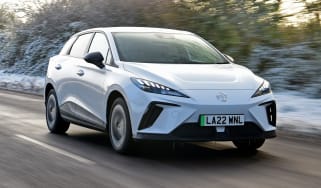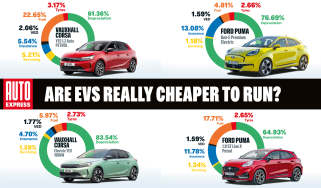Can you tow with an electric car? Top EV towing questions answered
The towing capacities of electric cars can vary greatly, but a number are well suited to towing caravans or trailers
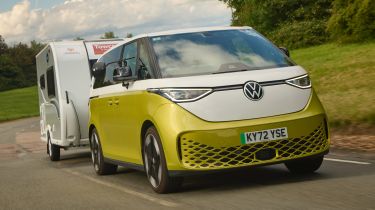
Until recently, electric cars generally weren’t rated for towing caravans or trailers, but as the 2030 ban on new petrol or diesel cars approaches and more people switch to an EV, more motorists are asking: ‘can I tow with an electric car?’ The short answer to that question is yes, you can tow with an electric car, but there are a few things you need to know before hitching up a trailer.
Petrol and diesel cars have long ruled the roost when it comes to the best towcars available, but thanks to the increasing selection of EVs on the market, as well as possessing qualities like powerful electric motors and having instant torque on tap, EVs are increasingly capable towcars.
The best tow cars with petrol and diesel engines are still generally rated for the largest loads when compared to electric cars, but many larger EVs will offer more than enough capacity for those looking to tow a reasonably-sized caravan. Even smaller models are now rated to tow small unbraked trailers.
We tested a Kia EV9 on a trip from Exeter to Land’s End with a Bailey Unicorn Deluxe Cabrera caravan attached and came up with some surprising results which we’ll examine in detail below.
If towing is a major part of your motoring life you no longer need to exclude electric or plug-in hybrid cars from your shopping list. Before you part with any hard-earned cash, you do need to make sure that you do your research and fully understand any limitations and what each vehicle can legally and safely tow.
Can you tow with an electric car?
Yes, you can tow with an electric car. However, not all EVs are made equal so you’ll need to make sure the EV in question has sufficient towing capacity and is type-approved for the item you want to tow.
A growing number of electric cars can now tow well over 2,000kg, so you’re not limited on choice when it comes to the caravan, car or trailer you want to tow, or the car you want to do the towing.
How much can an electric car tow?
The official towing weight for electric cars varies from model to model, and also depends on what sort of trailer or caravan is being towed: braked or unbraked. The weight limit for an unbraked trailer is always lower than for a braked trailer.
One of the best electric towcars currently available is the BMW iX which perfectly illustrates the differences between braked and unbraked towing capacity.
In its top-of-the-range xDrive50 or high-performance M60 specification, the BMW iX is capable of towing a braked trailer weighing up to 2,500kg, which is more than enough for a larger caravan or trailer. When it comes to the BMW iX’s unbraked capacity, it has a limit of only 750kg.
The Kia EV9 is also able to match the BMW iX’s maximum braked capacity of 2,500kg in four-wheel drive guise, but its unbraked limit is the same at 750kg. These figures are not far away from what you might expect from an equivalent petrol or diesel car, although some models like the Land Rover Defender can tow up to 3,500kg braked.
At the other end of the market an entry-level Hyundai Ioniq 5 can only manage 750kg regardless of a trailer’s braking system; upgrading to the Long Range car increases the braked weight limit to 1,600kg.
Interestingly, some very powerful electric cars are not rated for towing at all. The Porsche Taycan in all its forms has not been type-approved for towing, nor its Audi e-tron GT sister car. Porsche buyers can specify a rear bike rack that attaches to dedicated mounts, but that’s it.
One of the lowest-rated electric cars we could find at time of writing was the Citroen e-C3 Aircross Standard Range which can pull up to 350kg braked and unbraked. This increases to a maximum of 550kg braked / unbraked in Extended Range.
The Hyundai Kona Electric in 65kWh guise has a higher braked limit of 750kg compared to the e-C3 Aircross, but can pull slightly less unbraked at 300kg unbraked. Either way, both cars should be more than capable if you plan on towing something like a small trailer.
Of course, most people will choose larger cars for towing duties and before you buy any electric car or hitch up a trailer to your EV, it’s best to check the towing limits. Be certain that the car is capable of safely and legally towing what you need it to.
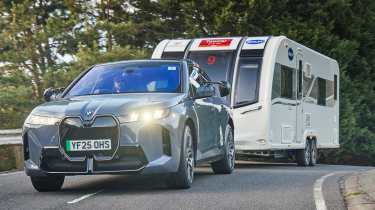
Do electric cars make good towing vehicles?
Electric cars make for great towing vehicles, as they have similar qualities to diesel cars, which are the preferred power of choice for towcars.
The main reason that larger diesel engines are the traditional choice for towing is torque, which is generally delivered low in a diesel’s rev-range and makes pulling trailers a doddle.
Electric cars have the benefit of powerful and near instant torque at any speed thanks to the linear nature of an electric motor’s power delivery. This means it’s surprisingly easy to get rolling when towing with an electric car.
Downsides of towing with an electric car
While the performance of electric powertrains is ideally suited to towing, it’s worth nothing that towing with an EV will drastically affect battery range. Moreover, stopping to charge an electric car with a caravan attached isn’t exactly an easy task at most charging spots.
We towed a 1.5-tonne Bailey Unicorn Deluxe caravan using a Kia EV9 from Exeter to Land’s End to see what impact towing a caravan could have on the car’s range. We followed the Kia in a Hyundai Ioniq 9 which uses the same EV powertrain and also recorded the efficiency of that car over the same trip.
The official WLTP range of the EV9 is 316 miles for the GT-Line AWD car we used, with the WLTP efficiency rated at 2.7 miles per kilowatt-hour. On our journey, however, we only managed 1.5 miles per kilowatt-hour, for the equivalent of just 150 miles of range on a full charge.
It’s worth pointing out that EVs rarely hit their claimed range figure – particularly on the motorway – but this is still undoubtedly a significant reduction as a result of towing a caravan.
Exeter to land’s End EV towing test results
| Car | Kia EV9 (with caravan) | Hyundai Ioniq 9 |
| Indicated range at start (100% battery) | 168 miles | 347 miles |
| Indicated range on arrival | 8 miles | 188 miles |
| Battery charge % on arrival | 6% | 59% |
| Trip efficiency | 1.5m/kWh | 2.8m/kWh |
| Official WLTP combined efficiency | 2.7m/kWh | 3.0m/kWh |
| Official WLTP combined range | 316 miles | 372 miles |
If your use case for a tow car is going on regular long-distance caravan holidays it’s likely that sticking with a diesel or petrol tow car might be more convenient.
The reduction in range and difficulty fitting into public charging bays with a trailer attached could make life with an EV difficult. If you typically tow for shorter distances, however, an electric car could be ideal.
Which electric cars can tow the heaviest trailers?
While the phenomenon hasn’t quite reached the UK yet, some seriously impressive electric tow cars are already available in the US, a market with an appetite for large, powerful pick-up trucks.
The Rivian R1T, for example, can haul 4,989kg, while the Ford F-150 Lightning can manage 10,000lbs – or around 4,535kg.
While some of these cars may make it to the UK in due course, not all of us would be allowed to make full use of those capacities: drivers with a standard licence can only tow a maximum of 3,500kg, although those who passed before 1 January 1997 are allowed a combined maximum weight (car and trailer) of 8,250kg.
As things currently stand in the UK, some of the best electric cars which can tow the most are the BMW iX, Kia EV9 and Hyundai Ioniq 9, which can all tow up to 2,500kg. The Audi Q6 e-tron isn’t far behind with a towing capacity of 2,400kg, while the Lotus Eletre can pull up to 2,250kg.
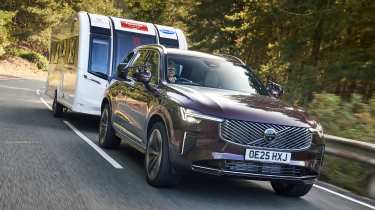
Can you tow with a plug-in hybrid?
According to the Caravan and Motorhome Club, hybrid cars are the best choice for anyone who wants to use an alternative-fuel vehicle for towing a caravan. We took part in their 2025 Tow Car of the Year test which highlighted some very capable hybrid tow cars.
Hybrids have a great combination of performance and economy when towing, and refuelling on the go is a little easier if you’re caught short.
In fact, there are several plug-in hybrid vehicles certified for towing, including the Land Rover Defender P400e, Toyota RAV4, Lexus NX 450h+ and BMW X5 xDrive50e
The Defender is as brawny as you would hope, with a 3,000kg braked rating. That’s down 500kg from the diesel equivalent, but still more than any electric car available in the UK. The X5 gets close with its 2,700kg rating.
The Toyota RAV4 isn’t intended as a working vehicle but can still hold its own, with a braked limit of 1,500kg, the same as its Lexus NX sibling.
Lots of miles to cover? These are the longest range electric cars...
Your electric car questions answered
- Should i buy an electric car?
- What’s the best way to buy an electric car?
- Is a hybrid, plug-in hybrid or electric car right for me?
- Should i buy a used electric car?
- Can i get a plug-in car grant?
- How is electric car range calculated?
- How much do electric cars cost to charge?
- How much do electric cars cost to run?
- How long do electric car batteries last?
- What happens to old electric car batteries?
- Should i get a heat pump on my electric car?
- What are fast charging and rapid charging?
- Should i get a home electric car charger?
- Is wireless electric car charging the future?
- What’s the history of the electric car?
If you’re ready to make the switch to an electric car, the Auto Express Buy a Car service can help you find a great deal on your next model. We can even help you sell your old car, too.




